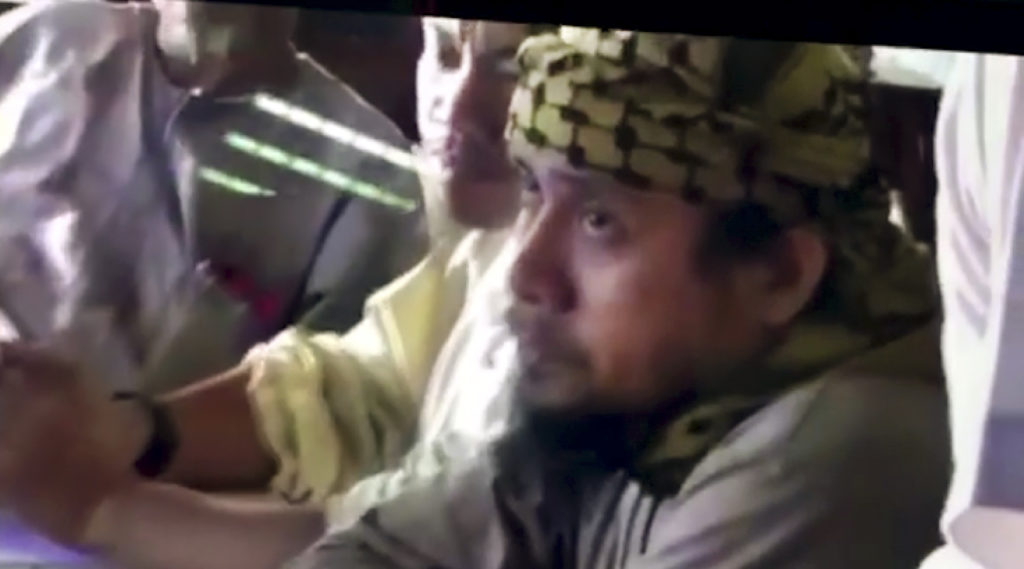
Isnilon Hapilon (Philippines Military via AP)
Abu Sayyaf leader and one of America’s most wanted terrorists, Isnilon Hapilon, may have escaped a five-week battle with Islamist militants in Mindanao, which began with a raid to capture him, the military said Saturday.
READ: Most wanted Hapilon often evasive
Hapilon, a veteran Filipino militant said to be the leader of the Islamic State (IS) group in Southeast Asia, has not been seen in the battle zone in Marawi City, said Lieutenant General Carlito Galvez, head of the military’s Western Mindanao Command.
An attempt by government troops to arrest Hapilon in Marawi on May 23, triggered a rampage by Islamist militants flying black IS flags who seized parts of the mainly Muslim city.
READ: Duterte offers P20M for Hapilon, 2 Maute brods
President Rodrigo Duterte declared martial law in Marawi and the entire southern region of Mindanao, unleashing military and police offensive to crush what he said was an attempt by the jihadist group to establish a province in the area.
“He (Hapilon) has not been seen in the area. We have some reports that he was already able to slip somewhere but as of now we are still confirming the reports,” Galvez said in an interview with DZBB radio station.
Asked if Hapilon was on the run, he said: “Yes, yes because reportedly he suffered a lot of casualties. Majority of his group, more than half, were casualties.”
Hapilon was indicted in Washington for his involvement in the 2001 kidnapping of three Americans in the Philippines, and has a $5-million bounty on his head from the US government, which has his name on its “most wanted” terror list.
He leads a faction of the Philippine militant group Abu Sayyaf that has pledged allegiance to IS.
Security analysts say he has been recognized by IS as its “amir,” or leader, in Southeast Asia, a region where the group wants to establish a caliphate or IS territory.
The military says Hapilon’s group had joined forces with another armed militancy, the Maute Group, to launch the Marawi siege, now on its second month.
On Saturday, security forces continued intense air raids and artillery fire on pockets of Marawi still occupied by the militants, while troops fought house-to-house gunbattles on the ground.
“The operation is going on, the firefights are intense. We have gained substantial ground,” said Galvez, the military commander.
Nearly 300 militants and 67 government troops have been killed in the fighting, according to official figures.
Galvez said there are “strong indications” that two or three of the Maute brothers—among the key players in the siege—had been killed, including Omarkhayam Maute, believed to be the group’s top leader.
Only one brother, Abdullah, has been visible in the fighting, Galvez added.
Press reports also quoted military chief General Eduardo Ano as saying that Malaysian Mahmud bin Ahmad, who helped lead and finance the Marawi siege, is believed to have been killed, although his body has not been retrieved.
When asked about Mahmud’s reported death, Malaysia’s Inspector General of Police Khalid Abu Bakar told AFP in a text message in Kuala Lumpur: “Not true. He is still alive.” JPV

